Growing trend of learning Chinese strengthens China-Kyrgyzstan ties
By Liu Xin in Bishkek Source:Global Times Published: 2019/6/19 16:53:40
○ More people in Kyrgyzstan are learning Chinese as they are interested in China's rapid development and want to find a job in a Chinese company
○ The trend of learning Chinese brings opportunities for people in Kyrgyzstan to better understand China's policies, including those in Xinjiang Uyghur Autonomous Region
○ Strong China-Kyrgyzstan ties help boost bilateral exchanges
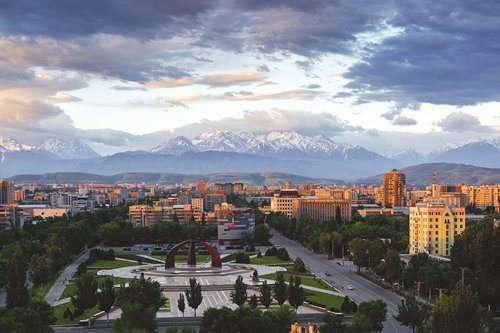
"The China-proposed Belt and Road Initiative has created many jobs in Kyrgyzstan, and young people who study Chinese can have more employment choices," Aiperi told the Global Times.
Aiperi spent four years studying Chinese in several cities in China from 2012, including Harbin in Northeast China's Heilongjiang Province and Wuhan in Central China's Hubei Province.
During her stay in China, she visited many cities, her favorite being Shanghai, as it is "modern and prosperous."
Aiperi teaches Chinese at the Confucius Institute. She said that in addition to correcting students' pronunciation and teaching them ways to remember Chinese characters, she also answers many questions about every aspect of China from them.
China's rapid development has prompted many people in Kyrgyzstan to learn Chinese in recent years, with the aim of studying in China or finding a job in a Chinese company.
Rising trend
"Four Confucius Institutes and 21 Confucius Classrooms are operating in Kyrgyzstan, and more than 7,000 students are studying at Confucius Institutes," Zhang Shicai, dean of the Confucius Institute at Bishkek Humanities University, told the Global Times.
As a former Soviet republic in Central Asia, Kyrgyz and Russian are official languages in Kyrgyzstan.
"Now, Chinese has become a popular foreign language learned by more students," Zhang said, noting that the Confucius Institutes in Kyrgyzstan have launched free Chinese classes in many primary schools, middle schools and universities, and some of these schools have listed Chinese as a required course.
Zhang explained that more students are taking the Chinese Proficiency Test in Kyrgyzstan, and they plan to hold 10 tests to meet rising demand.
In addition to the Confucius Institutes, middle schools that offer Chinese classes have also become more popular in Kyrgyzstan.
Chinese President Xi Jinping noted in a signed article, which was published in Kyrgyz media on June 11 before his visit to the Central Asian country last week, that the Bishkek No. 95 Middle School, built with Chinese assistance in 2017, has become the most popular school in the area.
The school has gained popularity among local students and parents since it was established in September 2017, Aigul Salikhovna, principal of the Bishkek No. 95 Middle School, told the Global Times in Bishkek.
"We offer different class hours in Chinese for students of different grades, for example, four classes a week for grade 8 to grade 10. We also give interesting classes on Chinese culture, including calligraphy classes, which are popular among students," she said.
Aigul noted that the school has launched a partnership with the Northwest University in Xi'an, Northwest China's Shaanxi Province, and more exchanges will take place between teaching faculty and students in schools in China and Kyrgyzstan.
The well-developed China-Kyrgyzstan ties and the progress of programs under the Belt and Road Initiative have brought many employment opportunities in Kyrgyzstan, which has encouraged many people in the Central Asian country to learn Chinese, experts said.
Students reached by the Global Times in Bishkek said that the monthly salary in a Chinese company in Bishkek could reach $500, while the average salary in Bishkek is about $200.
Deeper understanding
While some of the students in Kyrgyzstan who learn Chinese are driven by a promising future, more are interested in China's rapid development and its political system, according to teachers and students reached by the Global Times.
"Students usually ask me questions on almost every aspect of China, including its culture, Shaolin kungfu, and its political system," Aiperi said.
Zhang said that the increasing number of students learning Chinese and intense people-to-people exchanges in recent years have shortened the distance between the two peoples.
"Many students who have studied in China become fond of Chinese food, its culture and lifestyle. They told their experience of visiting Chinese cities to their friends and relatives in Kyrgyzstan, which help them get a better understanding of China," Zhang said.
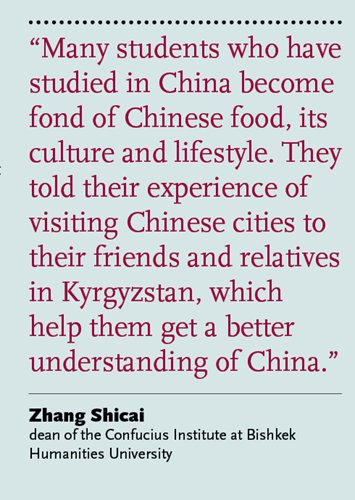
Some people in Kyrgyzstan may have some misunderstandings of China, including China's policies in Xinjiang. But students who have studied in China, especially those who have lived in Xinjiang, believe the current de-radicalization policies there are "good for enhancing the security situation," Zhang said.
"Students and their parents all said that Xinjiang is a very safe region," Zhang said.
Kyrgyz police dispersed anti-China protesters who gathered partly due to China's policies in Xinjiang in the early part of this year, Reuters reported.
As part of its anti-terrorism and de-radicalization efforts, the Xinjiang regional government has launched vocational training centers to help people who have been influenced by extremism and terrorism receive education on national laws and de-radicalization knowledge.
"Those very few people who attended the anti-China protests had little knowledge of what is really happening now. Their activities cannot represent the view of the Kyrgyz people," Talasbek Mashrapov, dean of the Faculty of Oriental Studies and International Relations in Bishkek Humanities University, told the Global Times.
Talasbek said that China's policies against terrorism and extremism are its internal affairs and other countries have no right to interfere.
"China's measures in Xinjiang to prevent extremism are also right. If China wants to realize its goal of stability and development, it would deal with its domestic affairs very well," he said.
Respecting China's sovereignty on implementing anti-terrorism and de-radicalization measures has become a consensus in Kyrgyz society, experts and scholars in Kyrgyzstan reached by the Global Times said. They also noted that Kyrgyz society and many politicians also showed an increasing interest in the Chinese government's governance experience recently.
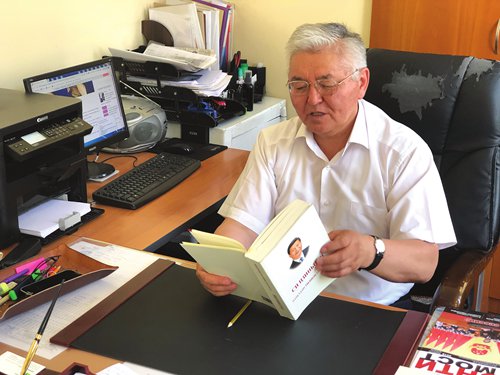
"I first read the Russian edition of the book in 2015 and kept reading it all day long. All the answers to my questions on China, including how it managed to have such rapid development in recent years, could be found in the book," he said.
Much of China's governance experience can serve as a reference for politicians in Kyrgyzstan, especially on anti-corruption, which has become a major problem in Kyrgyzstan, Talasbek said, noting that "Kyrgyz officials should learn to understand the needs of the people and do their work from the grass-roots level."
The Kyrgyz edition of the first volume of Xi Jinping: The Governance of China was released at a ceremony at the presidential residence in Bishkek on June 9.
Talasbek recommended that all officials, scholars and people who are interested in China read the book.
Future cooperation
Chinese companies are widely involved in infrastructure construction in Kyrgyzstan. Many roads in Bishkek, which link landmark buildings built in the style of the former Soviet Union, have been built by Chinese companies.
Talasbek seemed very confident in the future of China-Kyrgyzstan ties when speaking of the current well-developed people-to-people and trade exchanges.
"People in Kyrgyzstan are hoping to achieve joint development together with China, especially under the Belt and Road Initiative," said Talasbek.
There have been more Chinese companies coming to Kyrgyzstan in recent years, helping with local infrastructure construction and boosting local employment.
Zhuo Min owns a company which mainly produces steel structures and engages in construction work in Bishkek. The company has taken part in the construction of many buildings, including a major power station in the city.
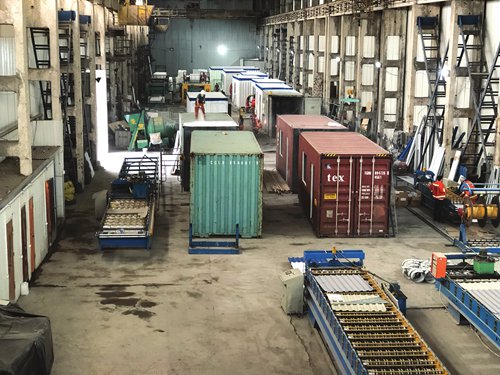
Zhuo's businesses in Kyrgyzstan have boomed in recent years with the launch of many projects under the Belt and Road Initiative. He has built a new office building next to the factory, where there are rooms for local workers to rest, pray and shower.
"We must respect local people's traditions and integrate into Kyrgyz society. Only by doing this can we have better development and also contribute to local society," Zhuo said.
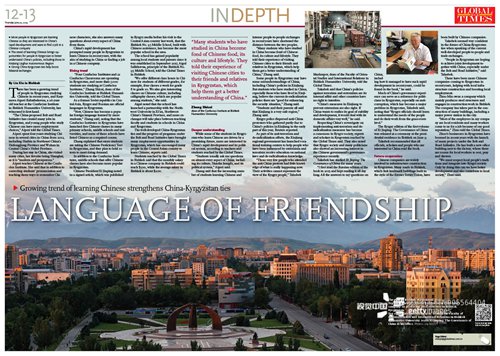
Newspaper headline: Language of friendship
○ The trend of learning Chinese brings opportunities for people in Kyrgyzstan to better understand China's policies, including those in Xinjiang Uyghur Autonomous Region
○ Strong China-Kyrgyzstan ties help boost bilateral exchanges

The view of Bishkek, Kyrgyzstan. Photo: VCG
There has been a growing trend of people in Kyrgyzstan studying Chinese in recent years, and Kasymova Aiperi Kubatbekovna, a 26-year-old teacher at the Confucius Institute in Bishkek Humanities University, has witnessed it first-hand."The China-proposed Belt and Road Initiative has created many jobs in Kyrgyzstan, and young people who study Chinese can have more employment choices," Aiperi told the Global Times.
Aiperi spent four years studying Chinese in several cities in China from 2012, including Harbin in Northeast China's Heilongjiang Province and Wuhan in Central China's Hubei Province.
During her stay in China, she visited many cities, her favorite being Shanghai, as it is "modern and prosperous."
Aiperi teaches Chinese at the Confucius Institute. She said that in addition to correcting students' pronunciation and teaching them ways to remember Chinese characters, she also answers many questions about every aspect of China from them.
China's rapid development has prompted many people in Kyrgyzstan to learn Chinese in recent years, with the aim of studying in China or finding a job in a Chinese company.
Rising trend
"Four Confucius Institutes and 21 Confucius Classrooms are operating in Kyrgyzstan, and more than 7,000 students are studying at Confucius Institutes," Zhang Shicai, dean of the Confucius Institute at Bishkek Humanities University, told the Global Times.
As a former Soviet republic in Central Asia, Kyrgyz and Russian are official languages in Kyrgyzstan.
"Now, Chinese has become a popular foreign language learned by more students," Zhang said, noting that the Confucius Institutes in Kyrgyzstan have launched free Chinese classes in many primary schools, middle schools and universities, and some of these schools have listed Chinese as a required course.
Zhang explained that more students are taking the Chinese Proficiency Test in Kyrgyzstan, and they plan to hold 10 tests to meet rising demand.
In addition to the Confucius Institutes, middle schools that offer Chinese classes have also become more popular in Kyrgyzstan.
Chinese President Xi Jinping noted in a signed article, which was published in Kyrgyz media on June 11 before his visit to the Central Asian country last week, that the Bishkek No. 95 Middle School, built with Chinese assistance in 2017, has become the most popular school in the area.
The school has gained popularity among local students and parents since it was established in September 2017, Aigul Salikhovna, principal of the Bishkek No. 95 Middle School, told the Global Times in Bishkek.
"We offer different class hours in Chinese for students of different grades, for example, four classes a week for grade 8 to grade 10. We also give interesting classes on Chinese culture, including calligraphy classes, which are popular among students," she said.
Aigul noted that the school has launched a partnership with the Northwest University in Xi'an, Northwest China's Shaanxi Province, and more exchanges will take place between teaching faculty and students in schools in China and Kyrgyzstan.
The well-developed China-Kyrgyzstan ties and the progress of programs under the Belt and Road Initiative have brought many employment opportunities in Kyrgyzstan, which has encouraged many people in the Central Asian country to learn Chinese, experts said.
Students reached by the Global Times in Bishkek said that the monthly salary in a Chinese company in Bishkek could reach $500, while the average salary in Bishkek is about $200.
Deeper understanding
While some of the students in Kyrgyzstan who learn Chinese are driven by a promising future, more are interested in China's rapid development and its political system, according to teachers and students reached by the Global Times.
"Students usually ask me questions on almost every aspect of China, including its culture, Shaolin kungfu, and its political system," Aiperi said.
Zhang said that the increasing number of students learning Chinese and intense people-to-people exchanges in recent years have shortened the distance between the two peoples.
"Many students who have studied in China become fond of Chinese food, its culture and lifestyle. They told their experience of visiting Chinese cities to their friends and relatives in Kyrgyzstan, which help them get a better understanding of China," Zhang said.

Some people in Kyrgyzstan may have some misunderstandings of China, including China's policies in Xinjiang. But students who have studied in China, especially those who have lived in Xinjiang, believe the current de-radicalization policies there are "good for enhancing the security situation," Zhang said.
"Students and their parents all said that Xinjiang is a very safe region," Zhang said.
Kyrgyz police dispersed anti-China protesters who gathered partly due to China's policies in Xinjiang in the early part of this year, Reuters reported.
As part of its anti-terrorism and de-radicalization efforts, the Xinjiang regional government has launched vocational training centers to help people who have been influenced by extremism and terrorism receive education on national laws and de-radicalization knowledge.
"Those very few people who attended the anti-China protests had little knowledge of what is really happening now. Their activities cannot represent the view of the Kyrgyz people," Talasbek Mashrapov, dean of the Faculty of Oriental Studies and International Relations in Bishkek Humanities University, told the Global Times.
Talasbek said that China's policies against terrorism and extremism are its internal affairs and other countries have no right to interfere.
"China's measures in Xinjiang to prevent extremism are also right. If China wants to realize its goal of stability and development, it would deal with its domestic affairs very well," he said.
Respecting China's sovereignty on implementing anti-terrorism and de-radicalization measures has become a consensus in Kyrgyz society, experts and scholars in Kyrgyzstan reached by the Global Times said. They also noted that Kyrgyz society and many politicians also showed an increasing interest in the Chinese government's governance experience recently.

Talasbek Mashrapov, dean of the Faculty of Oriental Studies and International Relations in Bishkek Humanities University, reads Xi Jinping: The Governance of China in his office. Photo: Liu Xin/GT
Talasbek has studied Xi Jinping: The Governance of China for many years."I first read the Russian edition of the book in 2015 and kept reading it all day long. All the answers to my questions on China, including how it managed to have such rapid development in recent years, could be found in the book," he said.
Much of China's governance experience can serve as a reference for politicians in Kyrgyzstan, especially on anti-corruption, which has become a major problem in Kyrgyzstan, Talasbek said, noting that "Kyrgyz officials should learn to understand the needs of the people and do their work from the grass-roots level."
The Kyrgyz edition of the first volume of Xi Jinping: The Governance of China was released at a ceremony at the presidential residence in Bishkek on June 9.
Talasbek recommended that all officials, scholars and people who are interested in China read the book.
Future cooperation
Chinese companies are widely involved in infrastructure construction in Kyrgyzstan. Many roads in Bishkek, which link landmark buildings built in the style of the former Soviet Union, have been built by Chinese companies.
Talasbek seemed very confident in the future of China-Kyrgyzstan ties when speaking of the current well-developed people-to-people and trade exchanges.
"People in Kyrgyzstan are hoping to achieve joint development together with China, especially under the Belt and Road Initiative," said Talasbek.
There have been more Chinese companies coming to Kyrgyzstan in recent years, helping with local infrastructure construction and boosting local employment.
Zhuo Min owns a company which mainly produces steel structures and engages in construction work in Bishkek. The company has taken part in the construction of many buildings, including a major power station in the city.

Chinese businessman Zhuo Min's steel structure production company in Bishkek, Kyrgyzstan. Photo: Liu Xin/GT
"Most of the employees in my company are local residents and many workers come to us for a job because of our good reputation," Zhuo told the Global Times.Zhuo's businesses in Kyrgyzstan have boomed in recent years with the launch of many projects under the Belt and Road Initiative. He has built a new office building next to the factory, where there are rooms for local workers to rest, pray and shower.
"We must respect local people's traditions and integrate into Kyrgyz society. Only by doing this can we have better development and also contribute to local society," Zhuo said.

Newspaper headline: Language of friendship
RELATED ARTICLES:
- Chinese president returns to Beijing after visits to Kyrgyzstan, Tajikistan
- China pursues broad levels of investment cooperation with Kyrgyzstan, Tajikistan
- China, Kyrgyzstan agree BRI key to bilateral ties, regional cooperation
- China, Kyrgyzstan agree to enhance ties to new heights
- Irkeshtam port: China's far west land port open to Kyrgyzstan